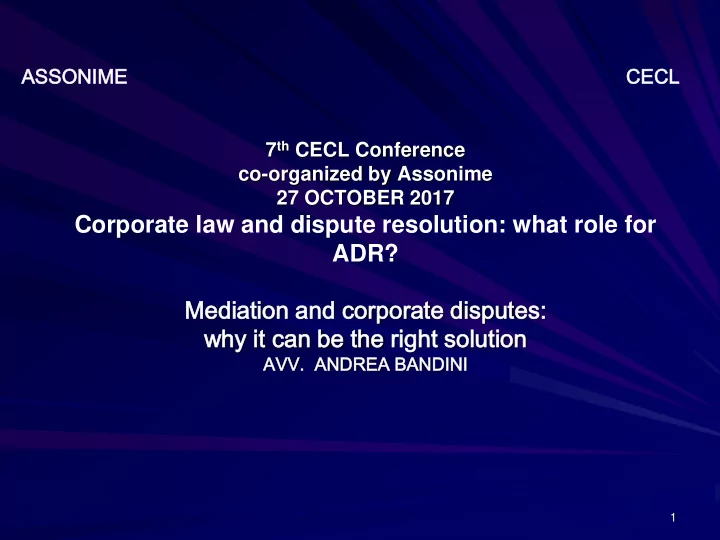

ASSONI NIME ME CECL CL 7 th CECL Conference co-organized by Assonime 27 OCTOBER 2017 Corporate law and dispute resolution: what role for ADR? Mediati ation on and corporate porate disputes utes: : why it wh it can be the rig ight t solu luti tion on AVV. . ANDREA REA BANDINI DINI 1
ANDREA BANDINI Corporation A corporation is a firm that meets certain legal requirements and is recognized as having a legal existence, as being an entity separate and distinct from its owners, owned by stockholders (shareholders) who share profits and losses generated through the firm's operations 2
ANDREA BANDINI Disputes involving corporations: • Intra-Corporate disputes: between shareholders, between shareholders and the company, and between shareholders and third parties such as the company directors. • External disputes: with business partners and with consumers In both cases, in principle (with some exceptions), Corporations should aim at maintaining the relationship with the other party 3
ANDREA BANDINI Reading the articles of incorporation or memorandum of association of a corporation I have never found, as a core purpose, the activity of “raising and managing disputes against others” . This kind of activity can only be instrumental in order to achieve their scopes Thus corporations are not established to deal with disputes . The direct consequences are: • Disputes involve a waste of time, resources, energy and money • Corporations (as any other) should avoid, if and when possible, to be involved in any kind of dispute • In case of dispute, corporations should choose the most cost/time/energy effective method to solve it 4
ANDREA BANDINI Possible solutions: 1. Court action 2. Arbitration 3. Mediation 4. Negotiation 5
ANDREA BANDINI Court action : the parties leave their dispute to their attorneys who shall manage the case before the judges taking into account only the parties’ rights Expensive (DISADV) Slow (DISADV) Unpredictable (DISADV) No more relationship between the parties (DISADV) “Open” to the public (DISADV) Formal rules (ADV/DISADV) Lack of technical expertise (for technical matters) (DISADV) Qualified judges… (ADV) Reasoned decisions (ADV) Right to appeal (ADV/DISADV) 6
ANDREA BANDINI Arbitration : the parties sit around a table, with a third party, a neutral, who decides the dispute taking into account only the parties’ rights: Speed and informality (ADV) Selection/choice of the arbitrator (ADV) Confidentiality (ADV) The parties are encouraged to meet and find an amicable solution (ADV) Finality/limitation of grounds of challenge (ADV/DISADV) Flexible (ADV/DISADV) 7
ANDREA BANDINI Mediation : the parties sit around a table, with a third, neutral, who helps them find a solution in the common interest, taking into account mainly the parties’ interests and needs Fast (ADV) Cheap (ADV) Confidential (ADV) Informal (ADV) Typically voluntary (ADV/DISADV) Relationships are maintained (ADV) Control of the outcome (ADV) Wide variety of solutions (ADV) Win-win solutions (ADV) Can be a waste of time because it does not always result in a settlement agreement (DISADV) Useless if a party needs a legal precedent (DISADV) Useless if the other party does not or will not cooperate (DISADV) 8
ANDREA BANDINI Negotiation : the parties sit around a table and try to find a solution in the common interest, taking into account mainly the parties’ interests and needs 9
ANDREA BANDINI We should probably change the order of precedence 1. Negotiation 2. Mediation 3. Arbitration 4. Court action 10
ANDREA BANDINI REAL CASE Limited liability company incorporated under the Italian law 2 shareholders (50% each) The company had 2 different businesses: a plant of manufacturing pumps and a plant of manufacturing valves; Pumps: started 20 years ago and very lucrative Valves: started (on one of the two shareholders’ initiative) 3 years ago and not lucrative at all Each shareholder managed a plant Discussions between the shareholders (deadlock) Several proceedings (civil and criminal) pending Discussions among the legal counsels 3 mediation meetings At the second one the mediator decided to talk only with the shareholders, without their legal counsel Agreement and preservation of the relationship 11
ANDREA BANDINI Why it worked: The mediation brought out a lot of useful information for the parties They clearly expressed, without the filter of third parties (respective counsels), theirs point of view The mediation had good results because both parties acknowledged some responsibility for the degeneration of their relationship and both wanted to put the past behind them and do things differently in the future. 12
ANDREA BANDINI Conclusion: Corporations (managers, directors and in-house counsels), in case of dispute, should – on a case by case basis and taking into account all the specific circumstances of the case – adequately consider (and they, the more and more, do so!) all the available disputes resolution methods in order to facilitate the early and smooth settlement of disputes and, thus, safeguard their interests and needs 13
ANDREA BANDINI THANK YOU 14
Recommend
More recommend